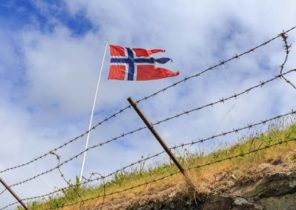
Now, when the short but wonderful period of liberal democracies, apparently, comes to an end, it makes sense to explore the advantages of autocratic forms of government with which we have to deal with in the next year or even Millennium. That’s why a hefty thousand-page volume by Simon Sebag Montefiore (Simon Sebag Montefiore) called “the Romanovs” appeared just in time — the book helps the reader to prepare spiritually for the advent of trump, Putin and Assad. And more successful, “Cicero” than Simon Sebag Montefiore, it is impossible to imagine.
British historian introduced the world to the amazing book about the young Stalin, which shows that the Soviet dictator was in his youth a terrorist, a womanizer, robbed banks and wrote poetry (by the way, very good). And now readers are invited to the prehistory of the red terror — the autocracy of one family, or rather clan, who came to power in 1613 at the end of the civil war and do not let go of their hands a throne for 300 years.
So what are the pros of autocracy should be taken into consideration based on an illustrative example from the history of Russia? First and foremost, you won’t be bored! Liberal democracy has grown only a few political figures to the level of Washington, Lincoln (Lincoln) or David Ben-Gurion (David Ben Gurion); most were, frankly, rather nondescript bespectacled man with the charisma of Bank Directors.
Pink color — for Elizabeth
The Romanov dynasty, in contrast, differed completely different characters (not mentioning yet about women) — it was a long row of monsters, madmen, fools and womanizers. Take Tsar Alexey, the big man with a red beard, who took the habit to associate the boyars and throw them into the icy river, if they missed the morning service.
Or think of Peter the Great: he ordered to behead his ex-beauty-lover, then took her bloody head by the hair and kissed him on the lips, and finally read around a small science report on the arteries and windpipe. (Peter the Great, by the way, was an enlightened, coming up with the time king.)
Well, to still mention ladies, remember the Empress Elizabeth, strictly forbade the court ladies to wear pink because pink was her favorite color and was reserved only for her. At the sight of beauties who dared to weave in hair flower forbidden colors, the Empress went into such a rage that he ordered that the criminal pulled the language on the scaffold.
Quartered, tied to the wheel, impalement
And indeed, death penalty! Quartered, tied to the wheel, impalement is such a boring punishment as hanging, the kings were rarely interested. Some of the Romanov could not resist personal participation in the torture chamber, when they tortured their enemies.
Will not be bored because, paradoxically, it is precisely the autocracy is the form of government in which it is often unclear who is actually Supreme. Now who will conduct the Affairs of the government — Donald trump (Donald Trump) or Steve Bannon (Steve Bannon)? Kooky Michael Flynn (as Michael Flynn) or this unpleasant Vice-President, what was his name?
Kings often were busy with more important things: hunted deer, wrote love letters, metal dwarfs (dwarf tossing was a popular court entertainment until the XVIII century). Governance, in this case fell on the shoulders of other people.
“Clinoptilolite and clinocephalism”
Sometimes there came a happy times: the reign of Catherine II, often called the great, really was during the reign of Prince Potemkin, her lover, who, fortunately, was a very able politician. However, sometimes the authorities let the charlatans and the crazy — the most famous such figure was, of course, Rasputin, a devout charlatan, aseptically Emperor Nicholas II different ideas even before the Bolshevik coup.
The second advantage of the autocracy: a lot of sex! In the Chapter “Orgy at the Royal court” ought not to imagine Catherine II and her wild stallions. Of course, the Empress, even being in old age, often indulged in amorous pleasures, however, was — according to Simon Sebag Montefiore — “serially monogamous”.
More promiscuity was characteristic of the reign of Peter the Great, who led the “Merry company” — false “archidiaconate”, which he himself appointed and styled with fun titles such as “sleepinal”, “clinocephaly and clintrials”. Guests were often completely naked and was by order of the Tsar to drink until drunk will not fall down under the table.
“Terrifying the Director of the circus”
Peter, according to Sebag Montefiore, were acting as a “ghastly circus Manager…, the commander of a sort of decadent version of a touring rock band hailing from the XVII century.” For him, the “government Affairs and feasts were inseparable”. The indulgent reader is forced to recognize the ugly liberal democracy can’t compete with the autocracy.
John F. Kennedy (John F. Kennedy), though I never missed a single skirt, was a (welcome) exception. Basically it is considered that democracy, to quote Donald trump, to horror is not enough “pussy”. The Ministerial meeting, parliamentary debates, hard talks, with the aim of reaching a compromise and orgies mutually exclusive.
The third advantage of the autocracy: to finally be finished with this boring world that provide a stable international alliances. So for the most part giant by Simon Sebag Montefiore is a directory of the successive commanders of the troops sent in retreat, then the front, as well as captured or abandoned fortresses. The players on the field (in addition to the Russian Empire): Sweden, Poland, Ottoman Empire, and later Germany, France, UK.
A personal relationship between the autocratic rulers of nothing! Nothing at all! For example? in 1807 Tsar Alexander I and Napoleon met on a ferry near the Tilzit (present-day Sovetsk). Both were happy with each other.
“Nicky” and “Willy”
They are so into each other, was sympathetic that in the presence of boring Friedrich Wilhelm III (Friedrich Wilhelm III), the melancholy king of Prussia, pretended that I went to bed to later sneak to sneak back to the fireplace and half the night to chat away with each other. And what is the result? Five years later the Grand army of Napoleon invaded Russia, and Moscow was in flames.
Another example: Nicholas II and Kaiser Wilhelm (also Second). They were cousins and called each other “Nicky” and “Willy.” In 1905 they met on the island of björkö in the Gulf of Bothnia, embraced, Wilhelm II pulled out the draft of the Russo-German Treaty, which, according to him, “accidentally” appeared in my pocket.
King Nicky said, “Fine,” and immediately signed the Treaty, the Emperor Wilhelm wiped the sweat from his forehead. Nevertheless, the Russian Minister of foreign Affairs subsequently extremely delicately drew the king’s attention to the fact that as a result of this agreement France, from which Russia depended for financial reasons, is deceived. “Nicky” was forced to tell “Willie” that only that the agreement was “not applicable”, that is totally invalid.
“Imminent violence”
Nine years later the Kaiser’s Germany and the Russian Empire mobilized against each other, while cousins still exchanged telegrams, expressing his surprise and resentment in connection with this development. The result was the worst known in history as the First world war.
So much information for those clever commentators who believe that the affection of Donald trump in relation to Putin at least guarantees that in the next four years will not have war between two nuclear powers — America and Russia.
“I feel obliterated terrible fatalism of history”, wrote in 1834 of the German poet Georg Buchner (Georg Büchner) from gießen to his bride. “I have found human nature a terrible identity, human relations — inevitable violence, is awarded to everyone and anyone. Single — only foam on the crest of a wave, greatness is only the case, the power of genius is a puppet play, a ridiculous struggle against an iron law, it’s impossible to know his greatness, nor to master them.”
It’s hard not to get BONEROWSKI terrible fatalism of history, reading the work of Montefiore. Because it suggests that Russia has never been and never could be no other destiny but to take the path of autocracy. The last Royal family, including the children — three girls and a boy, the Bolsheviks destroyed in the basement, but later they ruled the country by using the proven methods of tsarism.
Eternal autocracy
Serfdom was restored through the creation of collective farms. Only the Bolsheviks were, of course, much more cruel and bloodthirsty than the Romanovs at their most grim, as Lenin and his “comrades” had the instruments of power of the modern state.
In General, Russia has never been governed by anything other than whip — not counting a short, light, but, unfortunately, a very jumbled episode of the democratic window in the reign of the drunken Boris Yeltsin. However, this window is very short and tight slammed his successor. Vintage Union king, officials and the Orthodox Church and today has a virtually unconditional power.
Thus, when reading the book begs a painful question about whether the autocracy in Russia a sort of natural entity to which like themselves seek any political things, if you do not meet obstacles in its path.
The water rises
And maybe it happens not only in Russia. Maybe autocracy is generally a natural phenomenon, and democracy — an unnatural, unusual, controversial. Perhaps Western liberal democracies is nothing like an island — an island not only in space but also in time — and now the water rises and slowly begins to flood.
At least from the “Romanov” we learn that under the autocracy, never a dull moment. And a lot of sex. And finally done with the world.







